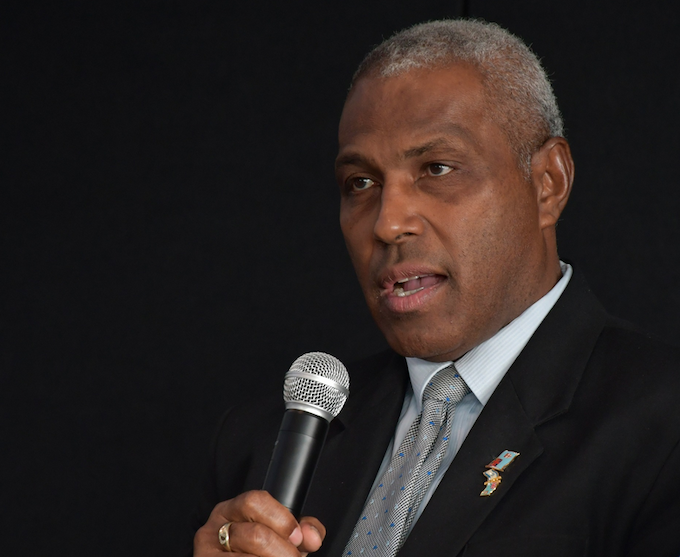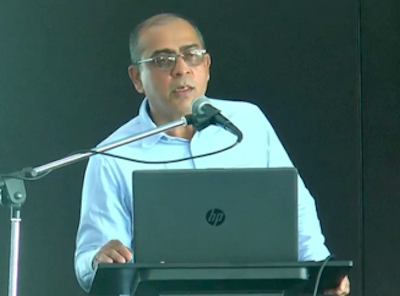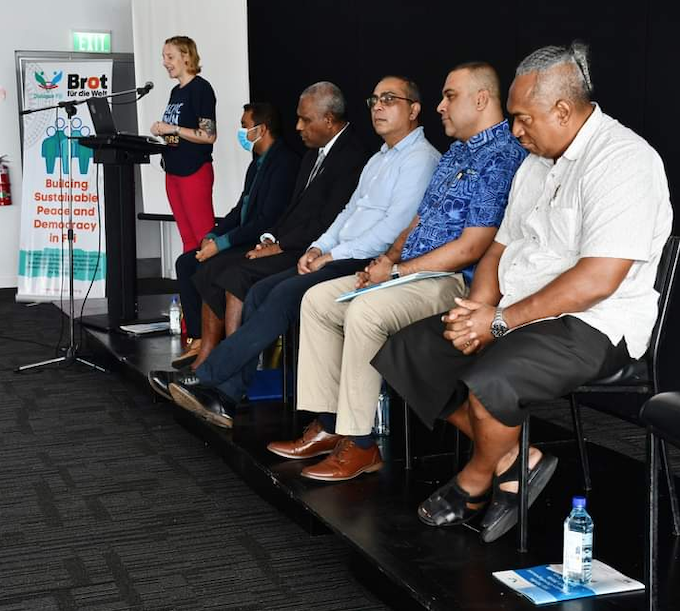
By Geraldine Panapasa in Suva
While steps are being taken behind the scenes by Fiji’s coalition government to review the country’s existing media legislation, civil society organisation Dialogue Fiji says coming up with a law that protects media freedom and safeguards against reporting that can have negative implications is difficult.
Speaking at the launch of the Fiji Media Industry Development Act 2010 – An Analysis report in Lami last week, Dialogue Fiji executive director Nilesh Lal said Fiji’s punitive Media Industry Development Act was promulgated in 2010 and remained in place, although the new Fiji government had expressed its intentions to replace it.
The report was produced by Dialogue Fiji and contained important lessons and insights on the challenging issue of media freedom and regulation in a multiethnic society with conflict dynamics like Fiji.
“We will need to consider elements such as capacity of the Fijian market to sustain a multiplicity of media players. Media ownership has been a key element of the regulatory regime under previous administration and this will need to be looked at,” Lal said.
“The challenges to traditional media posed by social media in a small market context will need to be considered to ensure that media organisations remain financially viable and a robust and diverse media sector is maintained.”
Lal said many lessons had been learnt from the experience of the past 12 years, operating under a highly restrictive and punitive media regulation.
He said it was important that stakeholders be consulted at every stage of the review process of the media legislation, including pre-drafting.
Friction possible
“If the draft does not meet expectations, it is going to unduly create friction between the government, media and other interest groups such as CSOs,” Lal said.
The launch programme also included a panel discussion on the issue of media regulation and features of the media legislation desirable in Fiji.
A Fiji government video of the Dialogue Fiji media freedom discussion.
Lal said as an organisation that championed democratic freedoms, dialogue and deliberations, Dialogue Fiji believed it was important to create opportunities for Fijians to deliberate on issues that affected their lives.
“Media freedom is an important element of freedom of expression. We need the media to be able to exercise this right, which is afforded to them in Fiji’s Constitution,” he said.
The comprehensive analysis on the Act was authored by USP Journalism Programme coordinator Associate Professor Dr. Shailendra Singh, Nilesh Lal and the chief deputy Attorney-General of Arizona (US) Daniel Barr.

Dr Singh said a major complaint against the Act from the media sector and observers was the ambiguities in some of the provisions.
“Section 22 is a good example of this. Section 22 states no content must include materials against the public interest, order, national interest or anything that might create disharmony in society,” he said.
National interest ‘subjective’
“The national interest/order can be subjective matters. The question is, who decides what is national interest or public interest, especially when these terms are so ill-defined in the Act.
“The reality is that the media, government and the public all have different viewpoints about what constitutes the national interest in any particular time or year. Vagueness in some of the provisions in the Act is another shortfall when it comes to international benchmarks.”
For issues like hate speech, he said it was important to ensure key terms were first defined.
“The broader the definition, the more it opens the door for arbitrary application of these laws. Some people might say, in all its years of existence, no one has been charged or prosecuted under the Media Act. Sometimes this is touted as a positive development but the problem is, it can be invoked at any time,” Dr Singh said.
“Even though no one might have been charged or cited, it is still like an axe hanging over the news media’s heads. This is why Media Act is accused of instilling a chilling effect on journalism in Fiji.”
Penalties excessive
Dr Singh noted that penalties in the Act were also in breach of some international benchmarks, adding that excessive sanctions should be reserved for exceptional cases. In Fiji’s Media Act, penalties applied across the board regardless of the seriousness of the offence.
He noted that there was little evidence of the separation of powers in the Act and that all powers were invested in the Communications Minister and Attorney-General, breaching international benchmarks on independence of regulatory bodies of government.
“Any national media regulatory body should be independent from the government in a democracy. The A-G and Communications Minister, who have so much power in the Act, are part of government and are expected or required to work in the interest of government first and foremost,” Dr Singh said.
“So two ministers had so much powers and are expected to work in unison, rather than in the interest of media organization,” Dr Singh said.
“What we found peculiar is that, with the previous government, the Communications Minister and A-G positions were held by the same person, one person with two different portfolios controlling everything. When we talk about separation of powers, it was almost non-existent in the Media Act.”
Dr Singh also noted that a core grievance with the Act was the criminalisation of ethics, adding that Fiji was one of the few countries in which journalism ethics had been criminalised.
Under self-regulation, ethics are considered non-punitive breaches but under the Media Act, a breach of ethics is treated as criminal offences.
“Ethics are not set in stone; you cannot have the same response for every ethical dilemma out in the field,” he said.
“Another key analysis in the Act is the lopsided hearing and appeal procedures where the appeal provisions for the media are restricted. It raises some really serious questions, for example, why are complainants against news media given full appeal whereas media can only appeal decisions for penalties more than $50,000?
“There is non-compliance of universal human rights, all should be equal before the law, provided equal protection of the law.”
Dr Singh said the Act was well protected legally so that no court of any kind could entertain any challenges by any person or body in relation to the validity or legality of the Act, and any decision of the Tribunal except for appeals.
“The immunity clause shows how the Act and its entities are bestowed all the powers without being bound by some of the core accountabilities of the justice system,” he said.
Government’s commitment
Attorney-General Siromi Turaga, who joined the panel discussion alongside newsroom editors from Fiji’s mainstream news media, said the coalition government recognised the pivotal role that the media played in Fiji, in terms of ensuring the circulation and responsible reporting of information.
He reaffirmed the government’s support of a free, independent and responsible media and reiterated that the Media Industry Development Act 2010 would be reviewed with the assistance of a committee that would be established for the task.
While there was no set timeframe on the completion of the review, Turaga said this was a priority for government as it continued to encourage robust journalism, urging journalists to also “practise fair and balanced reporting, and most importantly, allow for the right of reply at all times”.
Turaga said the analysis by Dialogue Fiji provided an insightful commentary on the Act and was a helpful resource for the review process.
Republished under the journalism education partnership between Asia Pacific Report and the University of the South Pacific regional journalism programme.













































